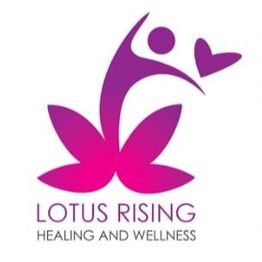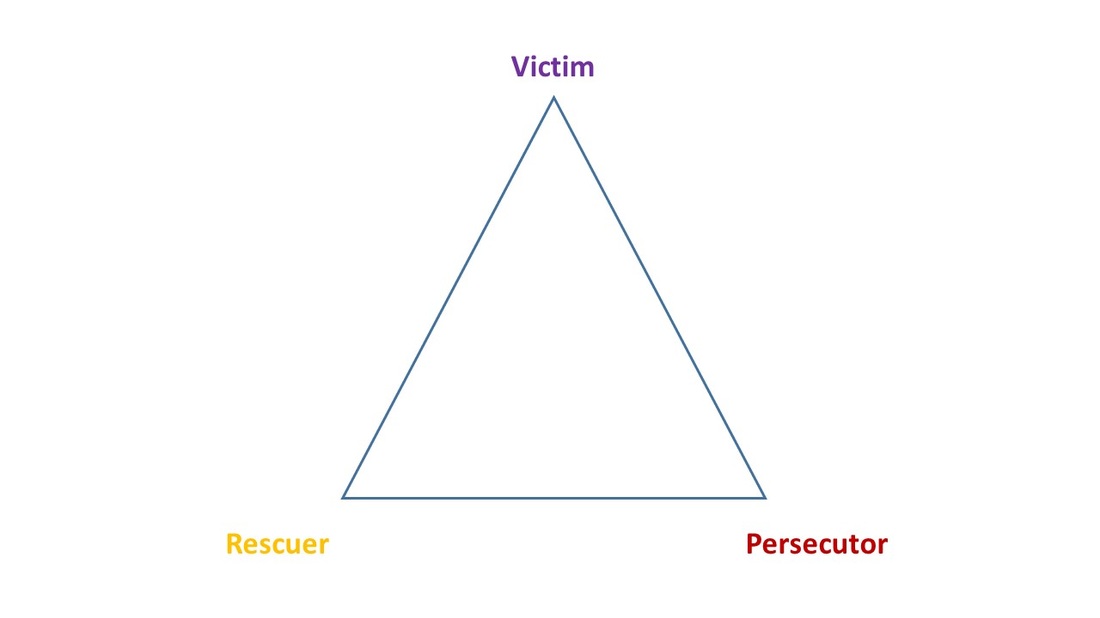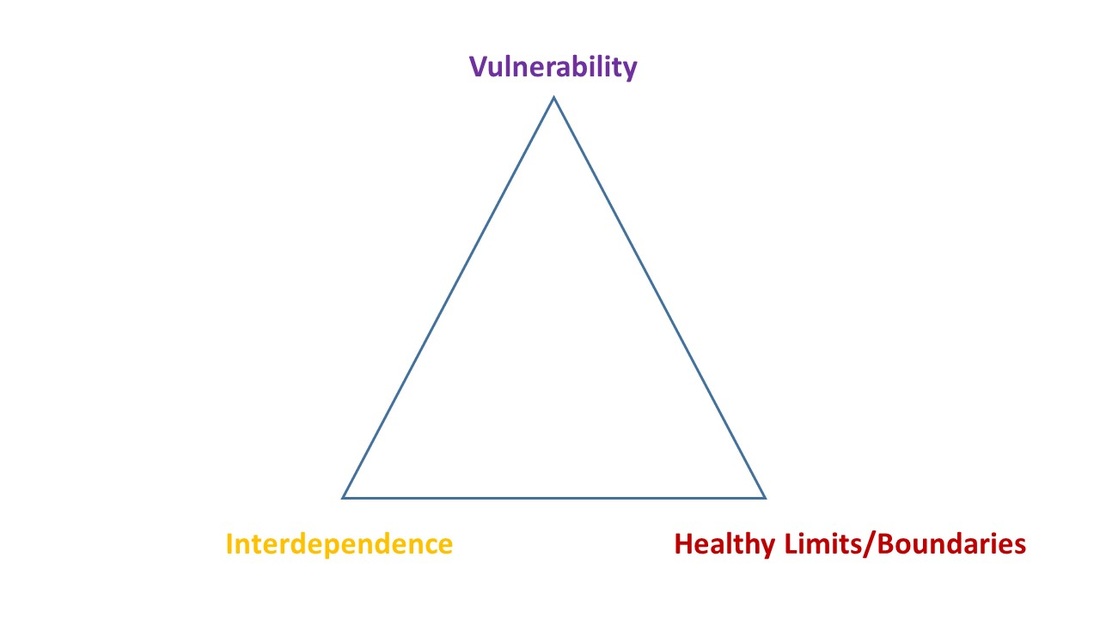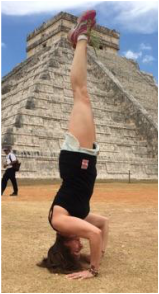Commonly referred to as the Victim or Drama Triangle, knowledge of this "holy trinity" of dysfunction, is necessary if one is to move beyond dysfunctional ways of getting needs met.
I have seen understanding of this triangular dynamic change more lives than I can count. So, what is it? It is a picture of the roles we take on as children in order to get our needs met, to be paid attention to, and to matter. It is present wherever codependence exists. Codependence describes anyone in a relationship, where neither participant is living from a place of wholeness, but instead, makes others responsible for their experience of life or feels responsible for other people's experience of life. That can manifest in different ways, namely as a helpless victim who believes they need others to take care of them, as a rescuer who takes care of everyone but themselves or as the persecutor who seeks to control others through the use of guilt, shame or raging. Underneath these dynamics is fear and shame, a sense of powerlessness (feeling overwhelmed and disconnected) and so the motivation in all of this is to feel powerful and connected with others. The presence of codependency has been found to lead to a loss of self and of personal power which can affect a person in any area of their life.
Why might one take on these roles? It's all about how we, as children, learned to be paid attention to. We must be paid attention to as humans. In orphanages, where babies and children have their physical needs met, but not their emotional needs, they die of a condition called failure to thrive. So, from the brilliance of a child, we learn the only way we can to get our needs met, either by being helpless, taking care of everyone or through intimidation. All of these roles are really the 'victim.' And all humans, to some extent use these methods to get their needs met. Take, for example, the people pleaser. They take care of everyone else and never say no. What do they get from this behavior? Acceptance. Belonging is a survival need that humans have. We learn to do whatever it takes so that we will not be abandoned, so people will like and accept us and so we can belong. Marshall Rosenberg, author of Non-Violent Communication says that all anyone is ever really doing is saying, "please." "Please like me, please accept me, please hear me, please let me belong, please notice me..." But we have found ways to do this at the expense of never getting our true needs met.
Lack of boundaries is what keeps the cycle alive. There is an underlying fear that if I ask for my true needs to be met, others will leave me and I will be alone. So, as a victim, I find rescuers who get their needs met by taking care of others, or as a rescuer, I take care of victims to meet my need of taking care of others. As a persecutor, I feel in control by shaming and threatening others so they do what I need them to do. In the end, no one ever really gets their needs met this way. What we are left with is the illusion that we are in control and connected with others, when we really aren't. We are not even connected with our own selves, which is the root cause of all of this, a broken relationship with ourselves. It's about feeling helpless and powerless and doing whatever it takes to get others to do what we need. And in the end, it only creates more separation from others and our own selves.
When we are on the triangle, we are also 'in our head.' For me that means we are identifying with the ego rather than with the truth of who we are. The ego believes in all that we are not and who we think we are supposed to be. Its identity is, "I'm not enough, I don't belong, I'm unlovable, I'm incapable, I have to prove my worth, I'm inadequate, I'm damaged, My existence doesn't matter, I don't matter..." The purpose of the ego is self-preservation. It works hard to hide these 'truths,' by defending, proving, comparing and competing. When we are playing our roles to get our needs met, its how we learned to survive and when we stay in those roles, our only hope is survival. If we want to move to thriving, we must take quite possibly the longest journey of our lives, thirteen long inches, down to our heart center where our truth resides. This involves healing the false beliefs of the ego (with a guide such a coach or therapist, knowledgeable about healing in this way) and allows us to get our true needs met.
When we are "in our heads," we are defending, proving, blaming and comparing, to name a few. This causes others to also put their defenses up and we end up arguing about who's right, who's wrong and not getting anything accomplished. Being right feels powerful. It gives us a sense of control, so acting from this place is about feeling powerful because we feel powerless (overwhelmed and disconnected).
When we act from our hearts, or our higher selves, or spirit self, we communicate how we feel, what we need, and we have healthy limits as well as boundaries. We know how to keep what is serving us, in, and what is not, out.
When we come into our hearts we can clearly communicate what it is we need. We know that we are responsible for meeting our own needs. We are vulnerable. We take full responsibility for our own experience of life and leave others to be responsible for theirs. We are clear about what works for us and what doesn't and we let others know so they can make choices about being in our lives or not. In doing so we have moved from being codependent to being interdependent. This transforms the dynamic of the triangle. Here's how that has looked in my own life:
The goal in understanding the triangle, is not to see where everyone else is on it as much as it is to see ourselves on it. It's sneaky. Becoming conscious of our own dysfunction is how we empower ourselves. We will get on the triangle so the goal is not to stay off of it, though that would be nice. It's to notice when we are on it so we can choose whether to stay or to come into our hearts.
According to the HeartMath Institute, the vibration of our heart is 5,000 times stronger than that of our head. We can make connections when we come from our hearts. Everyone can get their needs met. And that's what we are trying to do in the first place! After all, we are all just kids, dressed up adult suits, appealing for love, desperately wanting to matter, to be noticed, to belong. When we do it in childish ways from a place of unhealed fear and shame, everyone suffers and we continue to survive instead of thrive. When we become child-like ... curious, playful, deep-feeling, spontaneous, undefended, risk-taking, present, accepting, explorative, unconcerned with people's judgements, we can begin to thrive. In my experience, it takes time and deep healing of our subconscious and unconscious beliefs, but it is possible. I am living proof!!
Oh and just a side note, --ain't nobody gonna like it when you jump out of the triangle game. When you stop playing this childish, rather than child-like game, people in your life will feel very threatened and will quite possibly project their fear and shame onto you as anger and rejection because they feel out of control and confused (disconnected and overwhelmed). This is not about you! And it's fairly inevitable at the beginning. But, don't lose hope, as you heal these patterns you will draw others into your life that are also healing them and you open the door for much deeper and more fulfilling relationships!
Maria Rippo is a Transformational Healing & Wellness practitioner with an online as well as a local practice in Bothell, WA. She is an Advanced Clinical Hypnotherapist and Holistic Coach, working towards her Master's and PsyD in Transpersonal Psychology, but mostly, she is a human trying to figure out how to navigate this thing called life. This article Copyright 2016 by Maria Rippo, all right reserved. To replicate or use any portion of this article, please do so in its entirety including this text or contact the author at [email protected].




 RSS Feed
RSS Feed